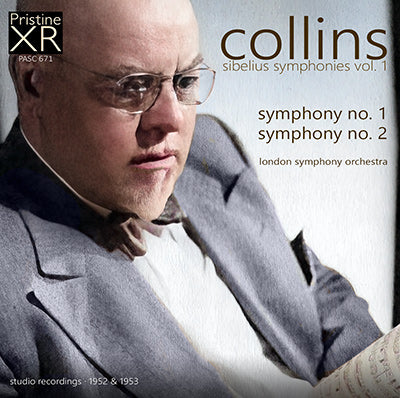
This album is included in the following sets:
This set contains the following albums:
- Producer's Note
- Full Track Listing
- Cover Art
“Anthony Vincent Benedictus Collins (3 September 1893 – 11 December 1963) was a British composer and conductor. He scored around 30 films in the US and the UK between 1937 and 1954, and composed the British light music classic Vanity Fair in 1952. His Decca recordings of the seven Sibelius symphonies was only the second cycle by a single conductor and orchestra to appear.
Collins was born in Hastings, East Sussex, in 1893. At the age of seventeen he began to perform as violinist in the Hastings Municipal Orchestra. He then served four years in the army. Beginning in 1920 he studied violin with Achille Rivarde and composition with Gustav Holst at the Royal College of Music.
In 1926, he began his musical career performing as principal viola in the London Symphony Orchestra. For ten years he performed in that orchestra and also in the Royal Opera House Covent Garden Orchestra. He resigned these positions in 1936. For the rest of his career he divided his time between conducting, beginning with opera and moving to orchestra; and composition. His conducting debut was on 20 January 1938, when he led his former colleagues in the London Symphony Orchestra in Elgar's First Symphony, and the following year he founded the London Mozart Orchestra.
He moved to the United States in 1939 to conduct orchestras in Los Angeles and New York City as well as composing film music for RKO Pictures. He was nominated for three Academy Awards for best music and original score in three consecutive years (1940, 1941 and 1942) for Nurse Edith Cavell, Irene and Sunny. He returned to England in 1945, continuing to conduct the major British orchestras and also compose for British film studios. He retired at the end of the 1950s, returning to Los Angeles, where he died at the age of 70 in 1963.
Collins conducted a series of classical recordings, notably of music of Elgar and Sibelius, for Decca Records and EMI. His Decca Kingsway Hall recordings made between 1952 and 1955 of the seven Sibelius symphonies (the second complete cycle with one orchestra and conductor; the first was by Sixten Ehrling and the Stockholm Philharmonic, 1952–1953) and the tone poems were very highly regarded. He recorded with Decca from May 1945 to December 1956.” – Wikipedia
Decca’s LXT series of mono LPs began in June 1950 with LXT 2500, making the first Sibelius symphony probably the 195th twelve-inch LP release for the company. Listening to it today, in this XR-remastered Ambient Stereo release, it’s hard to believe the new technologies of tape and vinyl were not in truly expert hands, and a glance at the name of recording engineer Kenneth Wilkinson immediately confirms this to be the case. This is the Sibelius of magnificent sweeping orchestration, vast soundscapes and beautiful fine details, all immaculately captured some seventy years ago.
The Sibelius was the first of a number of recordings Anthony Collins made with the London Symphony Orchestra; he had already recorded for Decca with both the London Philharmonic and his own London Mozart Orchestra prior to beginning the Sibelius series – his first recording with the former orchestra playing music by Bizet and Falla graced LXT 2510 and was among the very first tranche of British LP releases, issued by Decca in June 1950, whilst his own orchestra had been recorded for 78rpm release in 1945 playing, not surprisingly, music by Mozart.
It is unfortunate that only Collins’ final three recording sessions for Decca were captured in stereo, with his Sibelius series (and much more) recorded entirely in mono. Glancing through the Decca discography it appears the majority of their earliest stereo experiments were conducted with vocal and operatic music, with stereo orchestral recordings not beginning in earnest until late 1956, just before Collins’ retirement. We can, however, with the use of Ambient Stereo, get some idea of the broad sweep of his sound, if not the placing of individual instruments. Even so, it’s a glorious thing to behold in these fabulous symphonies.
ANDREW ROSE
COLLINS The Sibelius Symphonies, Volume 1
SIBELIUS Symphony No. 1 in E minor, Op. 39
1. 1st mvt. - Andante, ma non troppo - Allegro energico (9:19)
2. 2nd mvt. - Andante (ma non troppo lento) (8:50)
3. 3rd mvt. - Scherzo: Allegro (4:36)
4. 4th mvt. - Finale: Andante - Allegro molto - Andante assai - Allegro molto come prima - Andante (ma non troppo) (11:36)
Recorded Kingsway Hall, London, 21-22 February 1952
First issued as Decca LXT 2694
SIBELIUS Symphony No. 2 in D major, Op. 43
5. 1st mvt. - Allegretto (9:26)
6. 2nd mvt. - Tempo andante, ma rubato (12:43)
7. 3rd mvt. - Vivacissimo (5:40)
8. 4th mvt. - Finale: Allegro moderato (13:06)
Recorded Kingsway Hall, London, 11-12 May 1953
First issued as Decca LXT 2815
London Symphony Orchestra
conducted by Anthony Collins
XR Remastered in Ambient Stereo by Andrew Rose
Cover artwork based on a photograph of Anthony Collins
Decca studio recordings
Producer: Victor Olof
Engineer: Kenneth Wilkinson
Total duration: 75:16

